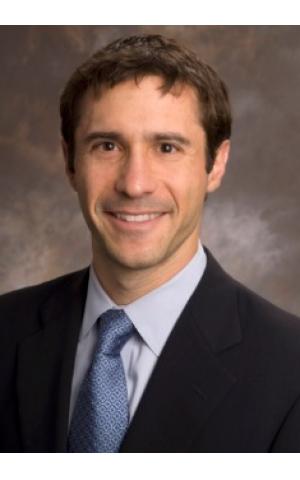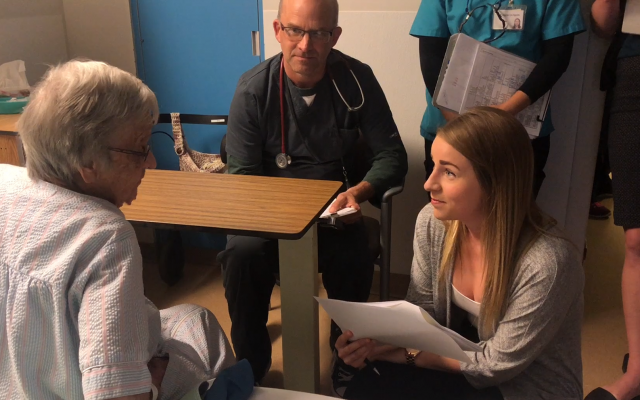Stein Aims for Sweeping Changes in Hospital Care
Dr. Jason Stein is ahead of the curve when it comes to improving outdated hospital systems that cause variation in clinical processes and, ultimately, patient frustration.
After 37 years with the Atlanta Journal-Constitution and now with the AJT, , Jaffe’s focus is lifestyle, art, dining, fashion, and community events with emphasis on Jewish movers and shakers.
Local physician and family man, Dr. Jason Stein is ahead of the curve when it comes to improving outdated hospital systems that cause variation in clinical processes and ultimately, patient frustration.
Through his experience and formula for better team communication, the software startup he formed with his brothers, 1Unit, provides hospital staff and patients more tools for efficiency, consistency and cost-savings resulting in improved patient care and less suffering.
Stein is the only person to win the Society of Hospital Medicine’s award for Teamwork in Quality Improvement for two years. In 2012, he was selected as innovation advisor for the Centers for Medicare & Medicaid Services.
Read how Stein is making strides:
Jaffe: You are a medical doctor. Did you originally intend to practice in this way?

Stein: I’m an internist whose focus is the hospital, also known as a hospitalist. I’m also a health services researcher, with a focus on improving outcomes for patients, families, and hospital staff. By the time I graduated from Emory University School of Medicine in 1998 and completed residency at Barnes-Jewish Hospital at Washington University in St. Louis in 2001, I had a sense that there was something important to do to improve hospital care. So, I went on to complete a faculty fellowship in healthcare quality improvement.
Jaffe: How did you get the idea to start 1Unit? Any one incident propel you?
Stein: The idea for 1Unit grew gradually over 15 years as I gained clinical and operational exposure to 100+ hospitals in the U.S., Australia and Canada. At some point, it became clear that hospital care could be so much safer and kinder for patients and staff, if a common set of challenges could be overcome. Hospitals may be the most complex human organizations and the stakes are high. Stress and suffering flow through the halls every day, and we spend a whopping 18% of our GDP on healthcare. Yet somehow, the world has never designed clinical operations to deliver the humane results we want and deserve. That’s the idea behind 1Unit and that’s the problem that propels us.
Jaffe: You are all sons of Dr. Kenneth Stein, professor of contemporary Middle Eastern history, political science and Israeli studies at Emory University. It’s a “family affair”?
Stein: I first started doing this work as a nonprofit when I was still at Emory. As interest from hospitals grew, the work needed a full-time focus. So, I left my faculty position and clinical practice, and along with my brothers, Todd and Andrew, formed 1Unit as a startup.
Jaffe: Where are you now in implementation?
Stein: Through our nonprofit, and now also through 1Unit, we’ve been able to help over 100 hospital units in 25 states and countries reorganize themselves into high-functioning teams. We have reports of higher patient and staff satisfaction. We have reports of fewer preventable deaths and complications of care. And we have reports of lower costs and better resource utilization. We’re seeing preventable pain and suffering all over the place, so we dream about being everywhere.
Jaffe: How would you summarize what 1Unit does? Is it a software system that hospitals buy?
Stein: Anyone who’s been a patient or caregiver in a hospital knows the frustration of feeling kept in the dark. When will I see my doctor? What’s the care plan? When can I go home? Most of that uncertainty and frustration comes from outdated ways hospital professionals organize and communicate with each other. We fix that by implementing a new type of interdisciplinary rounds that bring the physician and nurse together face-to-face with the patient at a predictable time.
Jaffe: What is the core of the problem? Is our health care system so overly impacted that doctors cannot get around to everyone smoothly? Is it red tape? Fear of malpractice?
Stein: The nexus of the problem is three types of failures. The first failure is operational: physician and nurse workflows are typically not designed to share time and space with each other or with patients. The second failure is educational: physicians and nurses typically lack the skills to communicate as high-performing teammates. The third is a failure of will and ambition; there’s no way to address the first two failures unless a hospital and its physicians acknowledge and commit to addressing them.
Jaffe: Does this lower the cost of healthcare?
Stein: We have reports from several hospitals who have discovered gains in productivity or efficiency, or reductions in cost of care.
For more information about 1Unit, visit www.1Unit.com.




comments